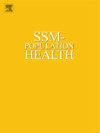Effects of a participatory learning and action programme in women's groups on adolescent girls: a cluster-randomized controlled trial in Bihar, India
IF 3.1
2区 医学
Q1 PUBLIC, ENVIRONMENTAL & OCCUPATIONAL HEALTH
引用次数: 0
Abstract
Background
Adolescence is a critical development period where young people acquire health behaviours, making this a crucial time for interventions targeting health. Participatory learning and action programmes aimed at improving maternal and child health are usually delivered through women's groups but could potentially impact adolescent girls as well, either through their direct participation or through information sharing in the community.
Methods
We used a cluster-randomized controlled trial to evaluate the impact of a large-scale participatory learning and action programme called Gram Varta on attitudes and health-related knowledge of adolescent girls in rural Bihar. The programme was implemented between 2015 and 2016 by state-supported agencies in women's self-help groups and additionally targeted adolescent girls for programme participation. Using household survey data on almost 700 girls aged 13–19 years, we estimated the community-level intention-to-treat effect of Gram Varta on adolescent girls. Outcomes included female empowerment, outlook on the future, preferences regarding marriage and childbearing, care given by parents, and knowledge and practices regarding reproductive health and contraception.
Findings
Out of 53 indicators, only one was statistically significantly affected by Gram Varta across specifications, suggesting an increase in the share of girls engaging in unpaid housework by about 12 percentage points.
Conclusion
Our findings suggest that Gram Varta did not change attitudes and knowledge of adolescent girls on the community-level. This could be due to low participation of girls in programme meetings as well as low levels of information sharing between adults who took part in this programme and adolescent girls.
妇女团体参与性学习和行动方案对少女的影响:印度比哈尔邦的一项集群随机对照试验
青少年时期是年轻人养成健康行为的关键发展时期,因此是开展针对健康的干预措施的关键时期。旨在改善孕产妇和儿童健康的参与性学习和行动方案通常是通过妇女团体提供的,但也可能通过少女的直接参与或通过在社区分享信息对她们产生潜在影响。方法我们采用一项集群随机对照试验来评估一项名为Gram Varta的大规模参与式学习和行动计划对比哈尔邦农村少女的态度和健康相关知识的影响。该方案在2015年至2016年期间由国家支持的妇女自助团体机构实施,并针对少女参与方案。利用近700名13-19岁女孩的家庭调查数据,我们估计了Gram Varta对青春期女孩的社区层面意向治疗效果。结果包括赋予妇女权力、对未来的展望、对婚姻和生育的偏好、父母的照顾以及有关生殖健康和避孕的知识和做法。在53个指标中,只有一个指标在统计上受到了格拉姆瓦尔塔的显著影响,这表明从事无偿家务劳动的女孩比例增加了约12个百分点。结论格兰·瓦尔塔在社区层面并没有改变少女的态度和知识。这可能是由于女孩很少参加方案会议,以及参加该方案的成年人与少女之间的信息交流程度较低。
本文章由计算机程序翻译,如有差异,请以英文原文为准。
求助全文
约1分钟内获得全文
求助全文
来源期刊

Ssm-Population Health
PUBLIC, ENVIRONMENTAL & OCCUPATIONAL HEALTH-
CiteScore
6.50
自引率
2.10%
发文量
298
审稿时长
101 days
期刊介绍:
SSM - Population Health. The new online only, open access, peer reviewed journal in all areas relating Social Science research to population health. SSM - Population Health shares the same Editors-in Chief and general approach to manuscripts as its sister journal, Social Science & Medicine. The journal takes a broad approach to the field especially welcoming interdisciplinary papers from across the Social Sciences and allied areas. SSM - Population Health offers an alternative outlet for work which might not be considered, or is classed as ''out of scope'' elsewhere, and prioritizes fast peer review and publication to the benefit of authors and readers. The journal welcomes all types of paper from traditional primary research articles, replication studies, short communications, methodological studies, instrument validation, opinion pieces, literature reviews, etc. SSM - Population Health also offers the opportunity to publish special issues or sections to reflect current interest and research in topical or developing areas. The journal fully supports authors wanting to present their research in an innovative fashion though the use of multimedia formats.
 求助内容:
求助内容: 应助结果提醒方式:
应助结果提醒方式:


